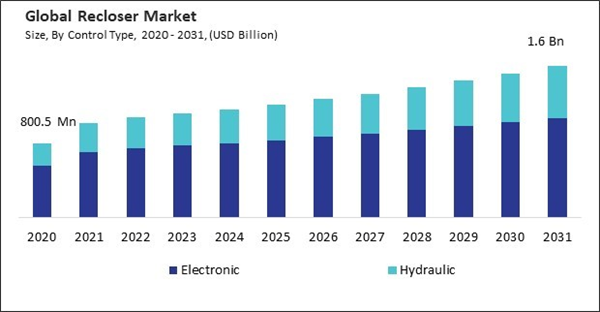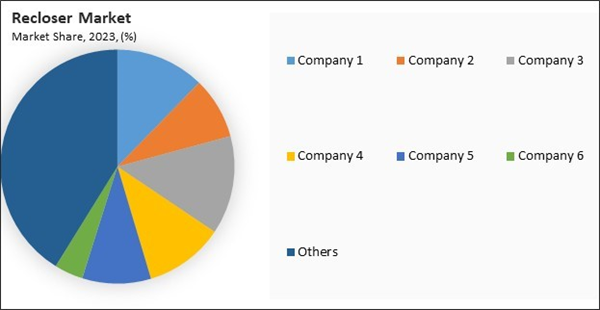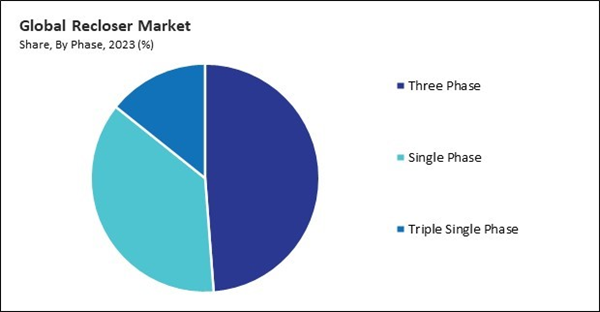Utilities in North America are investing in grid modernization initiatives to enhance grid efficiency, reliability, and resilience. Thus, the North America acquired $332.3 million revenue in 2023. Reclosers with advanced features like communication capabilities and remote monitoring are increasingly being deployed to support these initiatives. They play a crucial role in integrating renewable energy into the grid, managing grid stability, and minimizing disruptions caused by fluctuations in renewable generation.
Urbanization and industrialization often increase electricity demand as population centers expand and industries grow. The expansion of the distribution network is used to serve the growing urban areas and industrial zones. Hence, increasing urbanization and industrialization create a favorable market environment for the recloser market.
Additionally, Energy storage systems help stabilize the grid by absorbing excess energy during periods of high generation and releasing stored energy during peak demand. Reclosers are crucial in integrating energy storage into the grid by ensuring seamless coordination between storage systems and other grid components. Thus, the growing deployment of energy storage systems significantly boosts the recloser market.
However, the high initial costs of recloser technology may lead utilities to question the return on investment (ROI) and long-term cost-effectiveness of deploying reclosers. If the projected benefits of recloser deployment do not outweigh the upfront investment and ongoing maintenance costs, utilities may hesitate to implement. Thus, high initial costs and maintenance costs obstruct the recloser market.
The leading players in the market are competing with diverse innovative offerings to remain competitive in the market. The above illustration shows the percentage of revenue shared by some of the leading companies in the market. The leading players of the market are adopting various strategies in order to cater demand coming from the different industries. The key developmental strategies in the market are Acquisitions, and Partnerships & Collaborations.
Driving and Restraining Factors
Drivers- Increasing urbanization and industrialization
- Growing deployment of energy storage systems
- Rising need for a reliable and modernized electrical grid
- High initial costs and maintenance costs
- Interoperability challenges for seamless integration of diverse systems
- Increasing adoption of renewable energy sources
- Rising frequency of extreme weather events
- Resistance to change among utility companies
- Increasing risk of cybersecurity
Control Type Outlook
On the basis of control type, the recloser market is classified into electronic and hydraulic. The hydraulic segment recorded a 31% revenue share in the recloser market in 2023. Hydraulic control reclosers are known for their reliability and durability. They are well-suited for harsh environmental conditions and can withstand high levels of electrical stress, making them ideal for use in various utility applications.Phase Outlook
Based on phase, the recloser market is characterized into three phase, single phase, and triple single phase. The three phase segment garnered a 49% revenue share in the recloser market in 2023. Three-phase reclosers are commonly utilized to protect three-phase electrical distribution systems. They are designed to handle faults and disturbances across all three phases of the power distribution network simultaneously.Voltage Rating Outlook
By voltage rating, the recloser market is fragmented into upto 15kV, 16 to 27 kV, and 28 to 38 kV. In 2023, the 16 to 27 kV segment acquired a 29.1% revenue share in the recloser market. Reclosers in this segment come in various sizes and capacities to accommodate different applications and load requirements within medium-voltage distribution systems.Insulation Medium Outlook
Based on insulation medium, the recloser market is divided into oil, air, and epoxy. The oil segment recorded a remarkable revenue share in the recloser market in 2023. In oil-insulated reclosers, the oil's insulating properties help prevent electrical arcing and maintain the integrity of the electrical circuit.Regional Outlook
Region-wise, the recloser market is analyzed across North America, Europe, Asia Pacific, and LAMEA. The Asia Pacific segment garnered a 37% revenue share in the recloser market in 2023. The Asia Pacific region is witnessing robust growth in its recloser market, driven by rapid urbanization, industrialization, and infrastructure development.List of Key Companies Profiled
- Schneider Electric SE
- Eaton Corporation
- ABB Ltd.
- Siemens AG
- General Electric Company
- Hubbell Incorporated
- S&C Electric Company
- ENTEC Electric & Electronic Co. Ltd
- G&W Electric Company
- NOJA Power Switchgear Pty. Ltd.
Market Report Segmentation
By Control Type- Electronic
- Hydraulic
- Three Phase
- Single Phase
- Triple Single Phase
- Upto 15 KV
- 16 to 27 KV
- 28 to 38 KV
- Epoxy
- Air
- Oil
- North America
- US
- Canada
- Mexico
- Rest of North America
- Europe
- Germany
- UK
- France
- Russia
- Spain
- Italy
- Rest of Europe
- Asia Pacific
- China
- Japan
- India
- South Korea
- Singapore
- Malaysia
- Rest of Asia Pacific
- LAMEA
- Brazil
- Argentina
- UAE
- Saudi Arabia
- South Africa
- Nigeria
- Rest of LAMEA
Table of Contents
Companies Mentioned
- Schneider Electric SE
- Eaton Corporation
- ABB Ltd.
- Siemens AG
- General Electric Company
- Hubbell Incorporated
- S&C Electric Company
- ENTEC Electric & Electronic Co. Ltd
- G&W Electric Company
- NOJA Power Switchgear Pty. Ltd.











